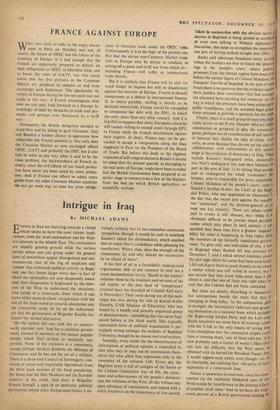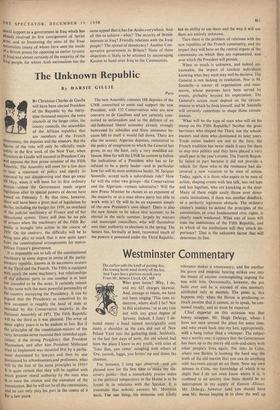Intrigue in Iraq
By MICHAEL ADAMS EVENTS in Iraq are hurrying towards a climax which seems to have the most sinister impli- cations, both for Arab nationalism and for West- ern interests in the Middle East. The communists are steadily gaining ground while the various parties whom one can group under the general label of nationalists appear disorganised and out- manceuvred. Out of the fog of suspicion and rumour that enshrouds political activity in Bagh- dad, one fact looms larger every day—a fact of which the nationalists are now desperately aware (and their desperation is heightened by the slow- ness a the West to understand the situation). Iraq stands at a crossroads, from which it can move either towards closer co-operation with the rest of the Arab world or towards absorption into the communist camp. So far all the indications are that the government of Brigadier Kassim has chosen the second alternative.
On the surface this may look like an unneces- sarily alarmist view. Iraq has a coalition govern- ment, formed of members of the various popular parties which Nun i es-Said so resolutely sup- pressed. None of the ministers is a communist, except perhaps Ibrahim Kubbeh, the Minister of Commerce, and he has not the air of a militant. There is a three-man Council of Sovereignty, con- sisting of senior and respectable figureheads from the three main sections of the Iraqi population, the Sunni and the Shia Moslems and the Kurdish minority in the north. And there is Brigadier Kassim himself, a man of no particular political persuasion, whose army background makes it ex- tremely unlikely that he has concealed communist sympathies (though it would be rash to overlook Kassim's talent for dissimulation, which enabled him to retain Nun's confidence while planning his overthrow). Where, then, does the strength of the communists lie, and why should the nationalists be so afraid of them?
It lies first of all in a formidable underground organisation, able at any moment to turn out a street demonstration to cry, 'Death to the traitors' (whether these be the ministers and servants of the old regime or the new haul of `conspirators' arrested since the downfall of Colonel Aref early in November). Their most daring use of this tech- nique was seen during the visit of Kama! el-Din Hussein, UAR Minister of Education, who was booed by a hostile and patently organised group of demonstrators—something that has never hap- pened before in the Arab world. This typically communist form of political organisation is par- ticularly strong amongst the students of Baghdad University, though by no means restricted to them.
Secondly, every outlet for the dissemination of information or political opinion is controlled by men who may or may not be communists them- selves but who allow free expression only to the viewpoint of the extreme Left. Every day the Baghdad press is full of eulogies of the Soviet or the Chinese Communist way of life, the attrac- tions and achievements of the people's democra- cies, the villainies of the West, all this without any open advocacy of communism, and indeed with a sickly insistence on the importance of free speech. Taken in conjunction with the obvious terror of anyone in Baghdad at being quoted or overheA or even seen talking to Western diplomats journalists, this helps to strengthen the improsini one gets of having walked straight into 1984.
Radio and television broadcast every evenin! (when the workers are free to listen) the proceed': ings in the 'people's court,' where politic prisoners from the former regime have been trie before the sinister figure of Colonel Mahdawi, tla Fouquier-Tinville of Baghdad. In the eyes of most Iraqis there is no question that the evidence again them justifies their conviction—but few amongst the educated have anything but contempt for the way in which the prisoners have been subjectedio public humiliation, and the accepted legal proce' dures misused to provide a spectacle for the mob, • Finally, there is a small group-of men who havc ready access to the Prime Minister who are either communists or prepared to play the communist game, perhaps out of consideration of self-interesl or because they dislike the idea of closer Arab unity, or even because they do not see the risks of collaboration with communism , at this uneasY stage in the evolution of democracy in Iraq. The-se include Kassim's bodyguard (who, ominouslY, was Nun's bodyguard too, and then botched bic part in the plot of July 14 by letting Nun i escape. and so endangered the whole revolution): Iv' brother, who is responsible for press censorship; Colonel. Mahdawi of the people's court—v, ho Kassim's brother-in-law; the Chief of the Buell' dad Police, who was appointed on December 1. the day that the recent plot against the republic was 'unmasked'; and the director-general of at least one key ministry. There are others whose part in events is still obscure, but—while it IS obviously difficult to be precise about develon- ments which take place in such secrecy—I ani satisfied that these men have a greater responst- bility for what is happening in Iraq today than the members of the formally constituted govern- ment. To give only one indication of this, I Nos in Baghdad when Rashid Ali was arrested On December 7, and I asked several ministers about the plot with which his name had been associated. I did not expect them to speak frankly to me about a matter which was still veiled in secrecy, but I am certain that they knew little more than I did about it, and that one of them was right when he said that the Cabinet had not been consulted.
But these are details, disturbing in themselves but unimportant beside the main fact that is emerging in Iraq today. As the communists gain in strength, the 'nationalists' (who are now grout)" ing themselves in a national front which includes the Right-wing Istiqlal, Party and the Left-wins Baath socialists) see sonic form of eventual union with the UAR as the only means of saving Iracl from absOrption into the communist empire ('and time is running short,' one of them told me; 'it IS now probably only a matter of weeks'). Here theY run into the difficulty that the West seems so obsessed with its hatred for President Nasser that it would oppose such union, even though—or, to be charitable, not realising that—the price of their opposition is a communist Iraq.
Nasser is powerless to intervene, since his inter- vention (in the resolutely blinkered eyes of the West) would be 'interference in the internal affairs of another Arab state.' And so we have the tratr comic picture of a British government lending Its moral support to a government in Iraq which has already received its first consignment of Soviet arms, and so frustrating the aims of the Iraqi nationalists (many of whom have seen the inside Qf a British prison for opposing an earlier tyranny in Iraq) and almost certainly of the majority of the Iraqi people, for whom Arab nationalism has the same appeal that it has for Arabs everywhere. And all this to achieve—what? The security of British interests in Iraq? Friendly relations with the Iraqi people? The spread of democracy? Another Con- servative government in Britain? None of these objectives is likely to be attained by encouraging Kassim to hand over Iraq to the Communists.


























 Previous page
Previous page